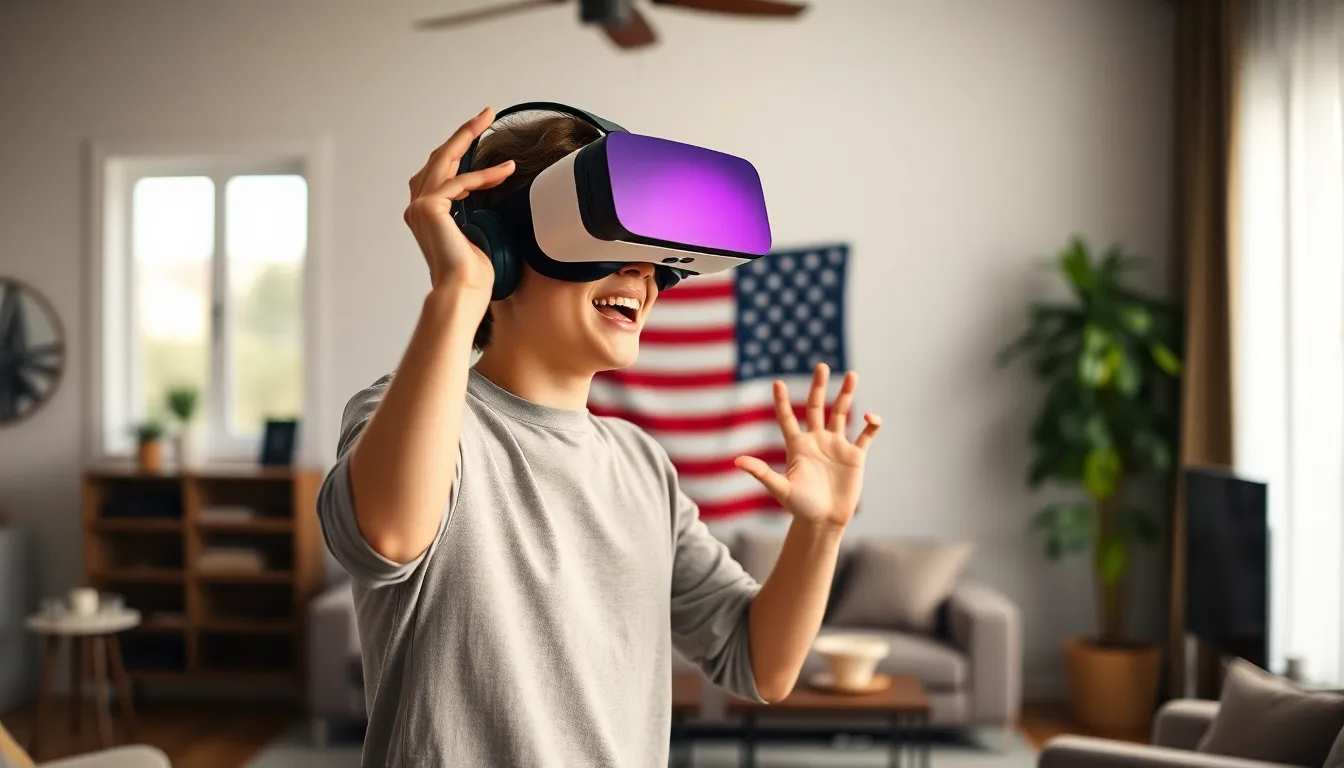Virtual reality promises a thrilling escape from the mundane, whisking users into fantastical worlds where anything is possible. But as they don their headsets and dive into these immersive experiences, a question looms: is VR bad for your brain? While some might argue that it’s just a fun way to dodge chores, others worry about the potential impacts on mental health and cognitive function.
Table of Contents
ToggleThe Rise of Virtual Reality
Virtual reality has gained significant traction in recent years, captivating users with its immersive experiences. Technology advancements made VR more accessible, transforming various sectors including gaming, education, and therapy. Those seeking escapism appreciate its ability to transport them to fantastical environments.
Studies showed that approximately 77% of Americans were familiar with virtual reality by 2022. Many users report heightened engagement in VR experiences compared to traditional media. Commercial applications also expanded, as industries recognize VR’s potential for training simulations and remote collaboration.
In education, VR enables students to experience historical events and complex scientific phenomena firsthand. Similarly, therapy utilizes VR to help patients confront fears in controlled environments, resulting in improved treatment efficacy. With this rapid growth, conversations about VR’s effects on brain health become crucial. Users must evaluate the balance between beneficial engagement and potential risks.
The time spent in VR varies significantly among individuals. While casual users might enjoy short sessions, others may engage for hours. Extended exposure raises questions about cognitive effects, such as dependency on virtual environments or diminished attention spans.
Researchers continue to explore the nuances of VR’s impact on mental health. Emerging studies indicate that excessive use might lead to feelings of isolation or disconnection from reality. Comprehensive investigations will provide valuable insight into these dynamics, aiding users in making informed decisions about their VR experiences.
Understanding Brain Function

Understanding how the brain reacts to virtual reality experiences offers insights into its potential impacts. The human brain adapts to immersive environments, processing sensory information from VR through sight and sound, similar to real-world experiences.
How the Brain Processes VR
The brain interprets VR stimuli as genuine, activating areas responsible for visual and spatial awareness. Engaging experiences stimulate neural pathways, enhancing learning and memory retention. Users often exhibit increased emotional responses due to immersive storytelling. Furthermore, the brain releases neurotransmitters, such as dopamine, creating feelings of pleasure and motivation. VR can also provide therapeutic benefits, helping individuals confront fears in a controlled setting. Each session can strengthen these cognitive connections, reinforcing the immersive experience.
Potential Cognitive Effects
Excessive VR use may lead to adverse cognitive outcomes. Users might experience difficulty in transitioning back to reality, affecting their perception of time and space. Attention spans could decline, contributing to challenges in focusing on real-world tasks. Isolation may also arise, as prolonged VR exposure can decrease social interactions. Researchers emphasize the importance of moderation, noting that balance is crucial in avoiding detrimental effects. Emerging studies continue to shed light on these cognitive risks, offering valuable guidance for safe VR use.
Negative Impacts of VR on the Brain
Virtual reality can contribute to several negative effects on cognitive function and mental health. Users may experience addiction or dependency as they immerse themselves in virtual environments, impacting their daily lives.
Addiction and Dependency
Addiction to VR may develop due to its highly engaging nature. Users can find themselves drawn into immersive experiences for extended periods. These prolonged sessions can disrupt daily routines, such as work and socializing. Research indicates that excessive VR usage can lead to withdrawal symptoms when access is limited. Users might crave the stimulation and engagement VR provides. Additionally, these compulsive behaviors can exacerbate issues like anxiety and depression, further complicating mental wellness. A balanced approach to VR, ensuring healthy boundaries, is crucial for maintaining mental health.
Visual and Spatial Awareness
VR experiences can alter visual and spatial awareness in significant ways. Users often navigate virtual environments that simulate real-world spaces, which may affect the brain’s spatial mapping abilities. Enhanced engagement with virtual stimuli can create impressive learning opportunities, but this overstimulation may also lead to disorientation. Users might struggle with real-world navigation after extended VR sessions. Reduced ability to accurately assess distances and spatial relationships could manifest as a result. Studies underscore the necessity of periodic breaks from VR to prevent these cognitive shifts, promoting better balance between virtual and physical interactions.
Positive Aspects of VR for the Brain
Virtual reality offers several benefits that can enhance mental capabilities and promote cognitive health. Its therapeutic potential is particularly noteworthy.
Therapeutic Uses of VR
VR provides innovative approaches in therapy, allowing users to safely confront fears and anxieties. For example, exposure therapy integrates VR simulations to help patients address phobias like heights or public speaking. Studies indicate that approximately 30% of individuals reported diminished anxiety levels after engaging in VR-based therapy. Relief from stress happens as participants immerse themselves in calming environments, leading to improved emotional regulation. Clinicians utilize VR for rehabilitation as well, assisting patients in overcoming physical limitations and enhancing motor skills through interactive exercises.
Enhancing Learning and Skills
Employing VR in education boosts engagement and retention rates. Experiential learning opportunities allow students to explore complex subjects, such as biology or history, with greater depth. For instance, virtual field trips enable students to visit historical landmarks from the classroom, enriching their understanding. Research shows that students retain up to 80% of learned material when experiences are immersive. Moreover, VR facilitates the development of practical skills, enhancing training in fields like medicine and aviation. Simulating realistic environments allows learners to practice safely and effectively, creating a foundation for real-world applications.
The impact of virtual reality on the brain is multifaceted. While it offers unique benefits in education and therapy, excessive use can lead to cognitive challenges and mental health issues. Users must navigate the fine line between enjoying immersive experiences and maintaining a healthy balance with reality. Moderation is crucial to avoid potential pitfalls such as addiction and decreased social interactions. As VR technology continues to evolve, understanding its effects on cognitive function will be essential. By prioritizing mindful use, individuals can harness VR’s advantages while safeguarding their mental well-being.


